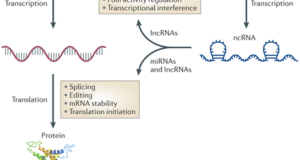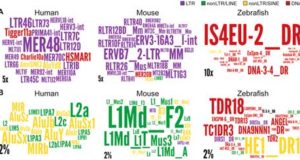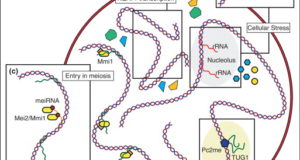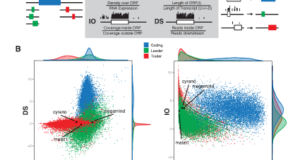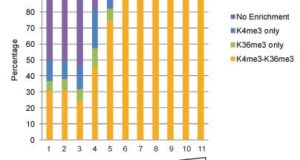The majority of currently available drugs and tool compounds exhibit an inhibitory mechanism of action and there is a relative lack of pharmaceutical agents that are capable of increasing the activity of effectors or pathways for therapeutic benefit. Indeed, the upregulation of many genes, including tumour suppressors, growth factors, transcription factors and genes that are deficient in various genetic diseases, ...
Read More »Long non-coding RNA: a new player in cancer
Emerging evidence showed that long non-coding RNAs (lncRNAs) play important roles in a wide range of biological processes and dysregulated lncRNAs are involved in many complex human diseases, including cancer. Although a few lncRNAs’ functions in cancer have been characterized, the detailed regulatory mechanisms of majority of lncRNAs in cancer initiation and progression remain largely unknown. In this review, the ...
Read More »What are lncRNAs?
from Exiqon.com It was traditionally thought that the transcriptome would be mostly comprised of mRNAs, however advances in high-throughput RNA sequencing technologies have revealed the complexity of our genome. Non-coding RNA is now known to make up the majority of transcribed RNAs and in addition to those that carry out well-known housekeeping functions (e.g. tRNA, rRNA etc), many different types ...
Read More »Transposable Elements Are Major Contributors to the Origin, Diversification, and Regulation of Vertebrate Long Noncoding RNAs
An unexpected layer of complexity in the genomes of humans and other vertebrates lies in the abundance of genes that do not appear to encode proteins but produce a variety of non-coding RNAs. In particular, the human genome is currently predicted to contain 5,000–10,000 independent gene units generating long (>200 nucleotides) noncoding RNAs (lncRNAs). While there is growing evidence that ...
Read More »JMB – NonCoding RNA
Video by Rachel Davidowitz, Freelance Scientific ‘Animator’
Read More »Cytotopic localization by long noncoding RNAs
Cells are highly organized structures. In addition to membrane delimited organelles, proteins and RNAs can organize themselves into specific domains. Some examples include stress granules and subnuclear bodies. This level of organization is essential for the correct execution of multiple processes in the cell, ranging from cell signaling to assembly of structures such as the ribosomes. Here the authors review ...
Read More »Ribosome profiling reveals resemblance between long non-coding RNAs and 5' leaders of coding RNAs
Large-scale genomics and computational approaches have identified thousands of putative long non-coding RNAs (lncRNAs). It has been controversial, however, as to what fraction of these RNAs is truly non-coding. Here, researchers from Harvard University and MIT combined ribosome profiling with a machine-learning approach to validate lncRNAs during zebrafish development in a high throughput manner. They found that dozens of proposed ...
Read More »Analysis of long non-coding RNAs produced by a specialized RNA Polymerase in Arabidopsis thaliana
Long non-coding RNAs (lncRNAs) play important roles in several processes including control of gene expression. In Arabidopsis thaliana, a class of lncRNAs is produced by a specialized RNA Polymerase V (Pol V), which is involved in controlling genome activity by transcriptional gene silencing. lncRNAs produced by Pol V have been proposed to serve as scaffolds for binding of several silencing ...
Read More »Long Noncoding RNAs May Alter Chromosome's 3D Structure
by Elizabeth Pennisi – Science Magazine Our 21,000 protein-coding genes aren’t the only readable units in our genome. At last count, another 13,000 “genes” specify mysterious molecules called long noncoding RNAs (lncRNAs), and when the final tallies are in, they may outnumber protein-coding genes. But what are these RNAs good for? Some researchers have suggested that they represent “noise”: DNA ...
Read More »Novel Long Non-Coding RNAs Are Regulated by Angiotensin II in Vascular Smooth Muscle Cells
Misregulation of angiotensin II (Ang II) actions can lead to atherosclerosis and hypertension. Evaluating transcriptomic responses to Ang II in vascular smooth muscle cells (VSMCs) is important to understand the gene networks regulated by Ang II which might uncover previously unidentified mechanisms and new therapeutic targets. Researchers at the Beckman Research Institute of the City of Hope set out to ...
Read More » lncRNA Blog lncRNA Research and Industry News
lncRNA Blog lncRNA Research and Industry News

